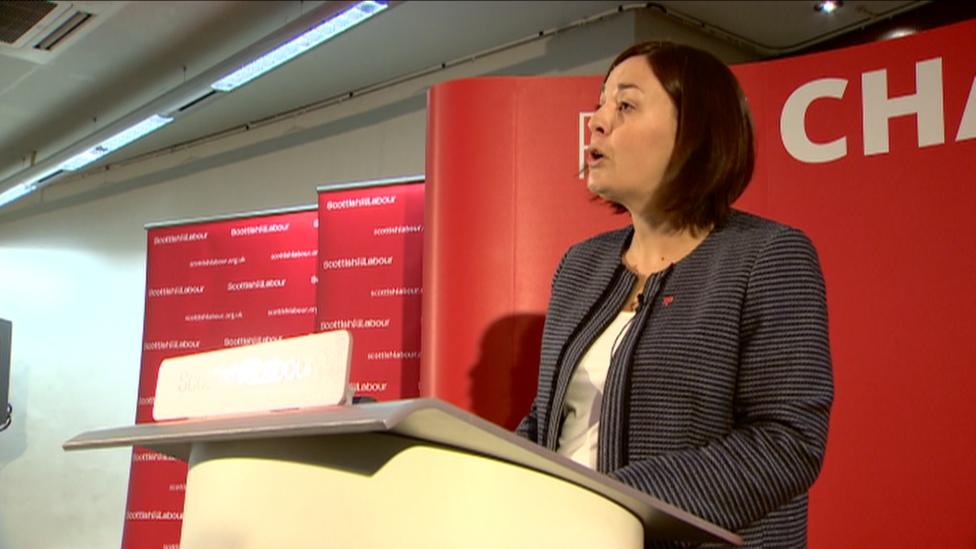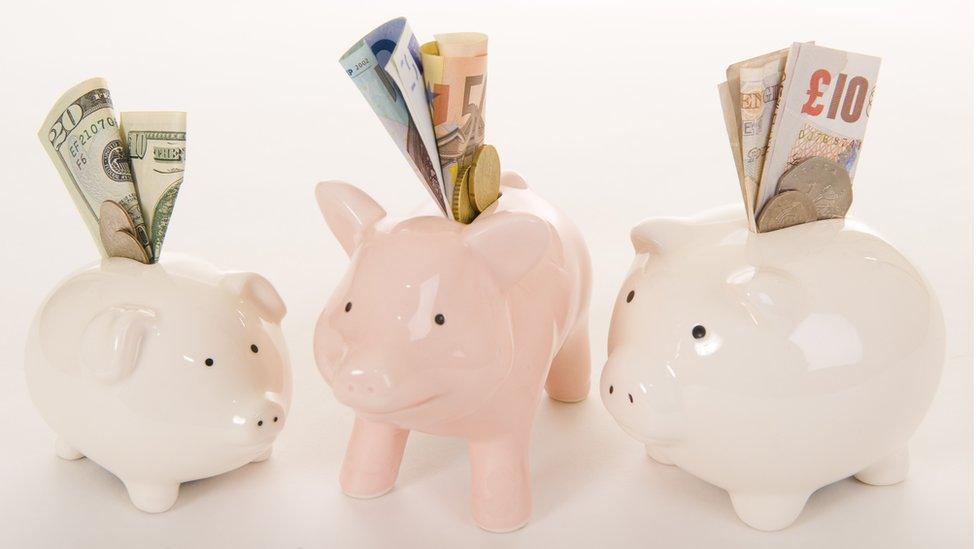Scottish Labour calls for Scottish income tax rise
- Published

Scottish Labour leader Kezia Dugdale said the lowest-paid workers would receive a £100 top-up under its income tax plan
Labour has called for an immediate 1p increase in Scottish income tax rates.
The party said the move would raise about £500m every year, which it said would be enough to avoid cuts to education and other local services.
Holyrood will be given limited powers over income tax rates from April, with more flexible powers later due to be devolved under the Scotland Bill.
The Scottish government has said it will not alter income tax rates until these greater powers come into force.
But that will not be until next year at the earliest.
Under the more limited powers, which have been devolved under the Scotland Act 2012, any changes in income tax rates would need to be replicated across all bands.
The Scottish government has argued that this would mean the least well-off would be hit hardest by any increase.
In his draft budget, which was unveiled in December, Finance Secretary John Swinney said he would be keeping income tax rates in Scotland the same as the rest of the UK in 2016/17.
He said he hoped the greater flexibility in setting income tax rates offered by the Scotland Bill proposals would allow the the Scottish government to introduce a "more progressive" tax regime in the future.
Minimum wage
But Scottish Labour said its plan for a 1p rise in income tax across all bands from April would be offset by taxpayers earning less than £20,000 receiving a £100 annual boost to their income through a payment scheme.
This £100 payment, which would be administered by councils, would be "far in excess" of the additional £20 which someone earning just above the minimum wage would pay in income tax over the course a year, the party said.
Labour said someone on a salary of about £30,000 a year would pay less than £4 a week extra under its plan.
But someone on the same £144,687 wage as the first minister would pay an extra £28 a week (£1,447 a year), it said.

What is the Scottish Rate of Income Tax?

From April of this year, the UK rate of income tax will be reduced by 10p in the pound in Scotland, across the 20% band, the 40% band and the 45% band
It will then be up to the Scottish Parliament to set its own rate to replace the 10p that has been taken out
This rate could be exactly the same as the rest of the UK, or it could be higher or lower
In his draft budget, John Swinney set the Scottish Rate of Income Tax at 10p - meaning it will remain the same as the rest of the UK
Both Scottish Labour and the Scottish Liberal Democrats have proposed an 11p rate - meaning all bands in Scotland would be 1p higher than elsewhere in the UK
Under the Scotland Bill proposals which are currently going through the UK Parliament, Holyrood would be given greater control over income tax rates and bands
This would allow the Scottish government to create new tax bands, and to raise the rate of tax paid by higher earners without also raising it for lower paid workers
But the Scotland Bill will not come into force until next year at the earliest

Scottish Labour's proposal would mean that income tax rates in Scotland would be higher than elsewhere in the UK.
Leader Kezia Dugdale, said: "Given the choice between using our powers or making cuts to our children's future, we choose to use our powers.
"We will tear up this SNP budget that simply manages Tory cuts and instead use the power we have to set the Scottish rate of income tax 1p higher than the rate set by George Osborne. This will provide an extra half a billion pounds a year to invest in the future.
"We don't do this because we want to use the powers for their own sake. We do it because there is no other alternative to cutting into our nation's future."
Mr Swinney's draft budget is due to be debated at Holyrood on Wednesday.
School funds
SNP MSP Stewart Maxwell said questions surrounded the figures being quoted by Scottish Labour.
He told BBC Scotland: "The Revenue and Customs say it's £475m. A £50m rebate would mean it's £425m.
"There would be administration costs. Would councils have to pay the administration costs or are Labour going to pay that?
"There's an HMRC charge. The fact is there are so many questions about this policy, I don't think it gets even off the starting block."
Last week, the Scottish Liberal Democrats also proposed increasing income tax rates by 1p to raise extra funds for schools.
But the Scottish Conservatives have said that taxes in Scotland should be no higher than the rest of the UK - and lower when affordable.
Scottish Tory leader Ruth Davidson said: "It would hit every basic rate taxpayer in the pocket. It would damage jobs and hurt Scotland's economic revival. And it would add ridiculous complexity to our tax system - with the lowest paid being asked to go to their local council to get a £100 cashback on a tax rise they never asked for.
"It simply isn't credible."
The Scottish Greens the ability to adjust the Scottish rate of income tax to make the tax take progressive was "extremely limited" and Labour's proposal would involve "extra complexity and cost".